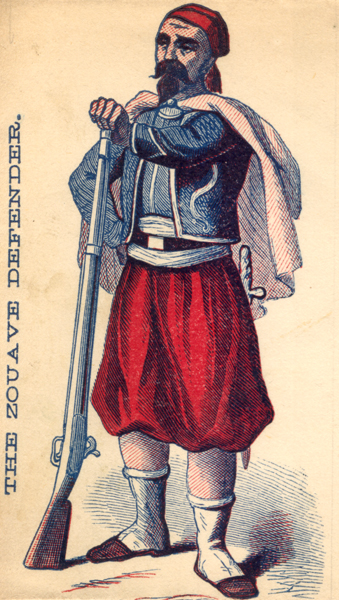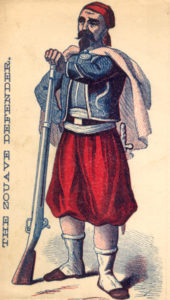Confederate Soldiers
More than 50,000 white men from Louisiana shouldered arms for the Confederacy.

Courtesy of Louisiana Research Collection at Tulane University Library
The Zouave Defender. Harbach & Bro., 36 N. Eighth Street, Philadelphia
More than 50,000 white men from Louisiana shouldered arms for the Confederacy. They served at all ranks and in every major battle from Bull Run to Appomattox. Approximately 20 percent of these soldiers perished in battle or from disease.
Volunteer companies had formed in Louisiana even before Abraham Lincoln’s 1860 election. With the state’s secession in January 1861 and the firing on Fort Sumter three months later, enthusiastic men rapidly signed up for military service. Unlike soldiers in later wars, Civil War volunteers joined companies composed almost entirely of men from their own community. The names of these units reflected this method of recruitment: the Baton Rouge Fencibles, the Clinton Guards, the Minden Rangers, and the Thibodaux Rifles. In New Orleans, organizational names also reflected nationality, with the Irish Brigade, the Blucher Guards (German), the French Legion, the Polish Brigade (more German than Polish), and the Garibaldi Legion (Italian). Community spirit prevailed as send-offs included barbecues that were highlighted by the local women’s presenting the company with a flag they had sewn. Women also often played a role in making the soldiers’ uniforms, which moved far beyond the stereotypical Confederate gray. Perhaps no group stood out more in this regard than the Louisiana Zouaves, who, according to several reports, initially wore red baggy pants, short blue jackets, and red fezzes.
The first volunteers drilled at Camp Walker in New Orleans, but the unhealthy conditions and marshy terrain there quickly led to the formation, in May 1861, of Camp Moore in modern-day Tangipahoa Parish. Later, other training camps would be established in Monroe and outside New Iberia (Camp Pratt.) These men may have trained in and fought for Louisiana, but they generally did not fight within the state’s borders. Instead, most Louisiana troops served in the eastern theater. In Virginia, Louisiana soldiers gained a reputation both for hard fighting and for less desirable behavior including drinking, plundering, and desertion. These “Louisiana Tigers” played a key role in the Confederate victory at Bull Run and saw combat at Antietam, Fredericksburg, and Gettysburg.
Throughout the war, Louisiana’s people and its politicians justifiably complained that with so many of their relatives fighting in the East, their state was unprotected. Generally, these grievances went unheeded. With the excitement of the early months of the war wearing off and with men realizing that military service in Virginia did not protect their families in Louisiana but left them more vulnerable, enlistment in the state slowed.
Recognizing that the army could not rely on volunteers alone, in April 1862 the Confederacy enacted a military draft. Louisiana furnished more than 8,000 conscripts, plus numerous men who volunteered to avoid the stigma of being drafted. The state’s swamps and piney woods also housed numerous draft dodgers determined to avoid service. In an effort to encourage enlistment and the acceptance of a draft, Louisiana’s local and state government provided financial aid to soldiers’ families, with the legislature authorizing $9.7 million to support those at the home front.
Prominent Louisiana Confederate Soldiers
Generals Pierre G. T. Beauregard, Richard Taylor, and Braxton Bragg rank as three of Louisiana’s most famous Confederate soldiers. In the early part of the war, Beauregard commanded forces at Fort Sumter, Bull Run, and Shiloh. Later he led defenses of Petersburg, Virginia, and opposed Sherman’s invasion of North Carolina in the war’s final months. In contrast to the Louisiana-born Beauregard, Richard Taylor, the son of President Zachary Taylor, had moved to the state in 1850. Nevertheless, his Civil War service cemented his ties to the Pelican State. In 1862, Taylor took charge of the small number of Confederate troops in Louisiana. Two years later, his troops stopped the Union’s Red River Campaign at the Battles of Mansfield and Pleasant Hill. Like his friend and fellow sugar planter Taylor, Bragg did not call Louisiana his birthplace and had made Thibodaux his home only in 1856. His subsequent Civil War service took him out of the state. His leadership of Confederate troops in Kentucky and Tennessee remains controversial today, both for his questionable tactical decisions and for his tumultuous relationship with his junior officers.
Accounts of the War by Louisiana Confederate Soldiers
More typically, of course, Louisiana soldiers served at lesser ranks. Fortunately, men such as Sergeant Edwin Fay, Private William Henry King, and the Pierson brothers left letters and diaries providing their reflections on the war. Their accounts illustrate how Louisiana soldiers struggled with such issues as poor food, inadequate clothing, and rampant disease. Additionally, these soldiers’ words demonstrate their views on diverse subjects such as state versus Confederate loyalty, the idea of the Civil War as a rich man’s war but a poor man’s fight, and the connection between the battle front and the home front. While their opinions may not be completely representative of the more than 50,000 Louisianans who fought for the Confederacy, they do provide a vivid depiction of life in the Confederate army.
